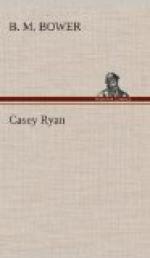To illustrate that point he told a story that set Casey’s mind to seeing visions. The man told about an old Indian who lived in dirt and a government blanket and drank bad whisky when he could get it, and whipped his squaw and behaved exactly like other Indians. Yet that old Indian knew where gold lay so thick that he could pick out pieces of crumbly rock all plastered with free gold. He was too lazy to dig out enough to do him any good. He would come into the nearest town with a rusty old lard bucket full of high grade so rich that the storekeeper once got five hundred dollars from the bucketful. He gave the Indian about twenty dollars’ worth of grub and made him a present of two yards of bright blue ribbon, which tickled the old buck so much that in two weeks he was back with more high grade knotted in the bottom of a gunny sack.
Casey asked the man why some one didn’t trail the Injun. Casey knew that an Indian is not permitted to file a claim to mineral land. He could not hold it, under the law, if some white man discovered it and located the ground, but Casey thought that some white-hearted fellow might take the claim and pay the buck a certain percentage of the profits.
The man said that couldn’t be done. The old buck—Injun Jim, they called him—was an old she-bear. All the Indians were afraid of him and would hide their faces in their blankets when he passed them on his way to the gold, rather than be suspected by Injun Jim of any unwarranted interest in his destination. Casey knew enough about Indians to accept that statement. And white men, it would seem, were either not nervy enough or else they were not cunning enough. A few had attempted to trail Injun Jim, but no one had ever succeeded, because that part of Nevada had not had any gold stampede, which the man declared would have come sure as fate if Injun Jim’s mine were ever uncovered.
Casey asked certain questions and learned all that the man could tell him,—or would tell him. He said that Injun Jim lived mostly in the Tippipah district. No free gold had ever been discovered there, nor much gold of any kind; but Injun Jim certainly brought free gold into Round Butte whenever he wanted grub. It must have been ungodly rich,—five hundred dollars’ worth in a ten-pound lard bucket!
The tale held Casey’s imagination. He dreamed nights of trailing Injun Jim, and if he’d had any money to outfit for the venture he surely would have gone straight to Nevada and to Round Butte. He told himself that it would take an outsider to furnish the energy for the search. Men who live in a country are the last to see the possibilities lying all around them, Casey said. It was true; he had seen it work out even in himself. Hadn’t he driven stage in Cripple Creek country and carried out gold by the hundred-thousand,—gold that might have been his had he not been content to drive stage? Hadn’t he lived in gold country all his life, almost, and didn’t he know mineral formations as well as many a school—trained expert?




